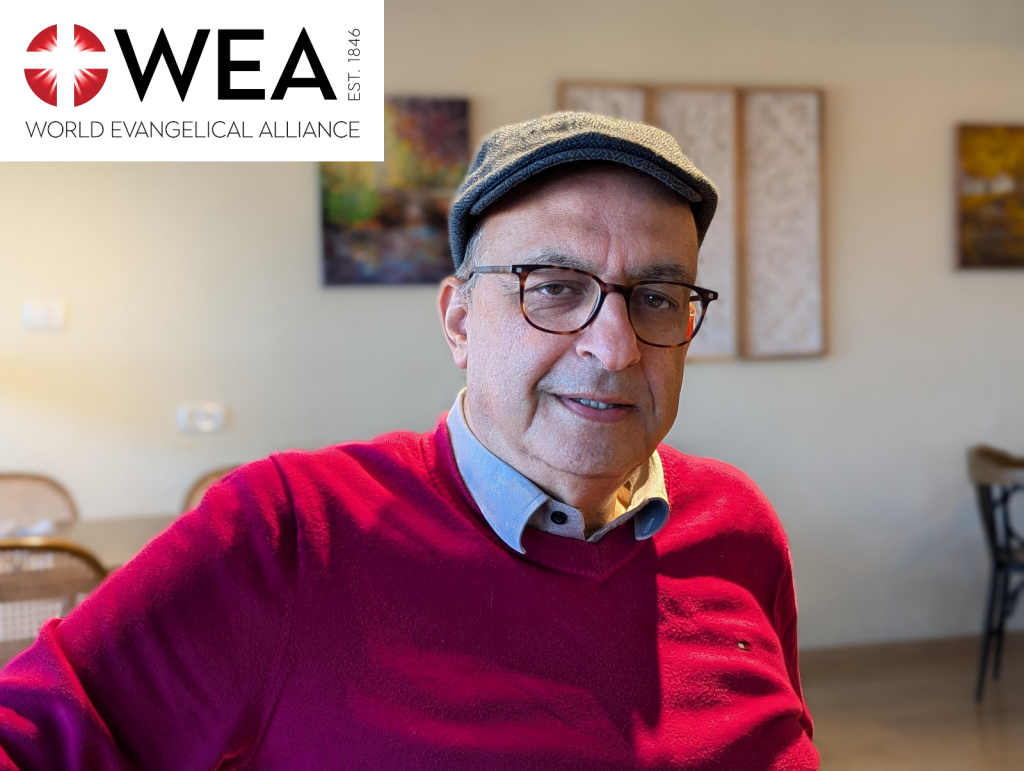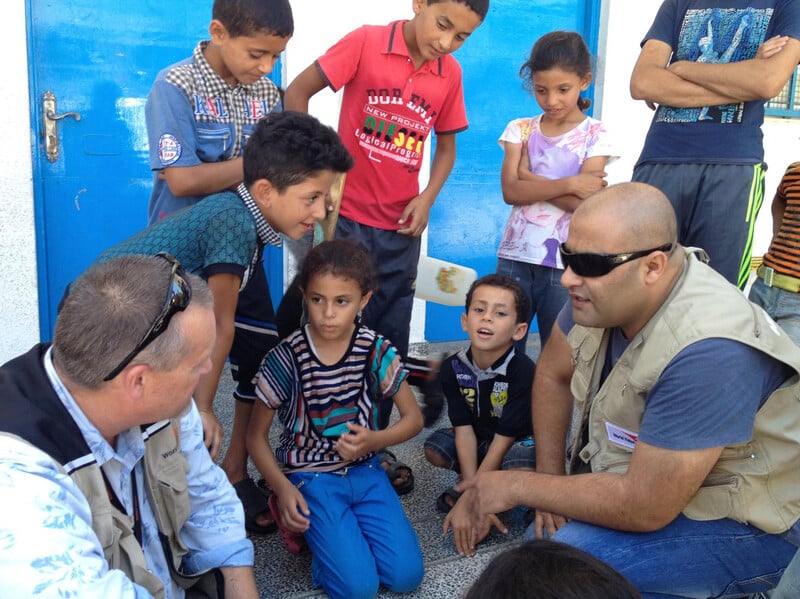
Previous Arab Evangelicals Celebrate Historic Appointment of Botrus Mansour as Secretary General of the World Evangelical Alliance

by Daoud Kuttab
It is hard to comprehend why World Vision, one of the leading Christian charities that prides itself on supporting vulnerable children worldwide, is nowhere to be found in the Gaza Strip.
According to the organization’s own history, founder Bob Pierce launched World Vision, choosing not to look away after confronting an abandoned child. Today, World Vision operates in over 100 countries, declaring proudly: “Even in the places where it is hard to be a child, God is there—and we should be there too.” Yet, in Gaza, the children suffer, and World Vision seems to have looked the other way.
World Vision had a presence in Gaza and remains officially registered by Israel to operate throughout the Palestinian territories. Its absence, however, stems from a unilateral decision made ten years ago. World Vision’s senior management decided to withdraw after Israel, seeking to weaken humanitarian aid in the besieged enclave, fabricated allegations against a staffer. Israeli authorities claimed that World Vision’s Gaza director, Mohammad El Halabi, had diverted $50 million (more than the entire budget for all projects in years) in aid to Hamas.
World Vision immediately commissioned top international auditors, and after three exhaustive investigations, the organization received a clean audit report. Despite this, El Halabi stayed in an Israeli jail. He consistently denied all charges, even when offered the chance to be free if he agreed to plead to a minor offense.
El Halabi maintained his innocence while Israeli prosecutors continued an unprecedented, highly irregular legal assault, spinning fictitious tales with no evidence. Amnesty International, along with the UN and other global human rights organizations, had long called for his release. Erika Guevara Rosas, Amnesty’s Senior Director for Research, Advocacy, Policy and Campaigns, noted: “Mohammed al-Halabi was unjustly targeted by Israeli authorities for his humanitarian work. He never should have been arrested in the first place, let alone forced to spend almost nine years unlawfully imprisoned. The Kafkaesque proceedings against him, including prolonged pretrial detention, multiple trial postponements, and a wrongful conviction relying on a single prisoner’s statement, were an appalling miscarriage of justice.”
El Halabi was released in one of the prisoner exchanges in February 2025. He was finally released to return to his family after nine years of unjust detention. Upon his release, he looked frail due to the deliberate reduction in food made available to prisoners. Yet even after his release, he insisted to his lawyers to keep following up on the appeal in the Israeli high court aimed to clear his name and that of his beloved aid organisation.
Yet World Vision, which publicly affirmed its support for El Halabi and has consistently believed in his innocence, has not reinstated him, paid back wages, or offered end-of-service compensation.
El Halabi’s family now along with all Palestinians in Gaza, struggles. After spending months in a tent in the south due to the first phase of the Israeli war on Gaza, they returned to their partially destroyed home, and they faced skyrocketing food prices under the Israeli siege. Like countless other Gazan families, they have become vulnerable despite their professional and middle-class background. El Halabi himself, who suffers lasting effects from imprisonment, torture (including partial hearing loss,) now his children face the same hardships.
One might understand World Vision’s caution in engaging with Israel, due to the apparent severity of the accusations. But a dedicated charity cannot excuse abandoning Gaza’s children, especially at this difficult period.
El Halabi’s reputation is unblemished; in 2014, the UN recognized him as one of the world’s “humanitarian heroes,” and World Vision, itself, awarded him “Humanitarian of the Year” for his tireless work under unimaginable conditions. Even though he is free, he has insisted on fighting his case. His appeal to the Israeli High Court, delayed for nearly two years, is now scheduled for next November.
World Vision and its funders, especially the Australian government (who also insist on his innocence), must not allow Israel to get away with defaming an innocent humanitarian and an organization dedicated to children’s welfare. The organization’s ethos, which includes: “working with the poor and oppressed to promote human transformation, and seek justice,” requires it to take action.
Bob Pierce refused to look away when confronted with suffering. Will Andrew Morley, World Vision’s CEO, and his international board, as well as donors and governmental partners, summon the courage to do the same as Bob Pierce? Will they return to Gaza, restore El Halabi’s position, and help one of the most vulnerable communities in the world?
The children of Gaza are waiting. And history will remember whether World Vision stood by them—or looked away.


تكافح مجلة “ملح الأرض” من أجل الاستمرار في نشر تقارير تعرض أحوال المسيحيين العرب في الأردن وفلسطين ومناطق الجليل، ونحرص على تقديم مواضيع تزوّد قراءنا بمعلومات مفيدة لهم ، بالاعتماد على مصادر موثوقة، كما تركّز معظم اهتمامها على البحث عن التحديات التي تواجه المكون المسيحي في بلادنا، لنبقى كما نحن دائماً صوت مسيحي وطني حر يحترم رجال الدين وكنائسنا ولكن يرفض احتكار الحقيقة ويبحث عنها تماشيًا مع قول السيد المسيح و تعرفون الحق والحق يحرركم
من مبادئنا حرية التعبير للعلمانيين بصورة تكميلية لرأي الإكليروس الذي نحترمه. كما نؤيد بدون خجل الدعوة الكتابية للمساواة في أمور هامة مثل الإرث للمسيحيين وأهمية التوعية وتقديم النصح للمقبلين على الزواج وندعم العمل الاجتماعي ونشطاء المجتمع المدني المسيحيين و نحاول أن نسلط الضوء على قصص النجاح غير ناسيين من هم بحاجة للمساعدة الإنسانية والصحية والنفسية وغيرها.
والسبيل الوحيد للخروج من هذا الوضع هو بالتواصل والنقاش الحر، حول هويّاتنا وحول التغييرات التي نريدها في مجتمعاتنا، من أجل أن نفهم بشكل أفضل القوى التي تؤثّر في مجتمعاتنا،.
تستمر ملح الأرض في تشكيل مساحة افتراضية تُطرح فيها الأفكار بحرّية لتشكل ملاذاً مؤقتاً لنا بينما تبقى المساحات الحقيقية في ساحاتنا وشوارعنا بعيدة المنال.
كل مساهماتكم تُدفع لكتّابنا، وهم شباب وشابات يتحدّون المخاطر ليرووا قصصنا.